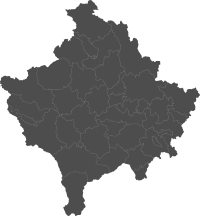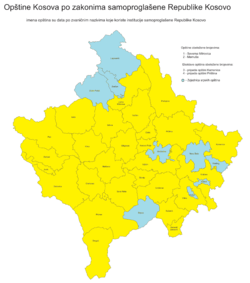Municipalities of Kosovo

A municipality (Albanian: komunë, Serbian: општина/ opština) is the basic administrative division in Kosovo.[a] There are 38 municipalities in Kosovo; 27 of which have Albanian majority, 10–Serb and 1–Turkish (Mamusha). After the 2013 Brussels Agreement between the governments of Kosovo and Serbia, Serbia recognised the municipalities and the Republic's governance of the territory, and agreed to create an association of Serb-majority municipalities, which will operate within the Kosovo legal framework.[1]
List of municipalities
| Name used on Wikipedia (most common version in English) |
Official name (Albanian) | Official name (Serbian) | Population (2011)[b] | Area (km2) | Density (km2) | Settlements |
|---|---|---|---|---|---|---|
| Deçan | Deçan | Dečani | 38,984 | 180 | 216.6 | 37 |
| Dragaš | Dragash | Dragaš | 33,997 | 435 | 78.2 | 35 |
| Elez Han | Hani i Elezit | Elez Han | 9,389 | 83 | 113.1 | 11 |
| Ferizaj | Ferizaj | Uroševac | 108,690 | 345 | 315 | 45 |
| Gjakova | Gjakova | Đakovica | 94,557 | 587 | 161.1 | 91 |
| Gjilan | Gjilan | Gnjilane | 90,015 | 385 | 233.8 | 54 |
| Glogovac | Gllogoc/Drenas | Glogovac | 58,531 | 290 | 201.8 | 37 |
| Gračanica | Gracanicë | Gračanica | 10,675 | 131 | 81.5 | 16 |
| Istok | Istog/Burim | Istok | 39,289 | 454 | 86.5 | 50 |
| Junik | Junik | Junik | 6,078 | 86 | 70.7 | 10 |
| Kaçanik | Kaçanik | Kačanik | 33,454 | 221 | 151.4 | 31 |
| Kamenica | Kamenicë/Dardanë | Kosovska Kamenica | 35,600 | 423 | 84.2 | 58 |
| Klina | Klinë | Klina | 38,496 | 308 | 125 | 54 |
| Klokot | Kllokot | Klokot | 2,556 | 24 | 106.5 | 4 |
| Kosovo Polje | Fushë Kosovë | Kosovo Polje | 34,827 | 83 | 419.6 | 15 |
| Leposaviq| | | Leposavić | 18,600 | 539 | 34.5 | 42 | |
| Lipljan | Lipjan | Lipljan | 57,605 | 422 | 136.5 | 70 |
| Mališevo | Malishevë | Mališevo | 59,722 | 361 | 165.4 | 43 |
| Mamuša | Mamushë | Mamuša | 5,507 | 11 | 500.6 | – |
| Mitrovica | Mitrovicë | Kosovska Mitrovica | 71,909 | 350 | 205.5 | 45 |
| North Mitrovica | Mitrovica Veriore | Severna Kosovska Mitrovica | 29,460 | 11 | 2,678.2 | – |
| Novo Brdo |Dardanë | Novo Brdo | 6,729 | 204 | 33 | 24 | |
| Obilić | Obiliq/Kastriot | Obilić | 21,549 | 105 | 205.2 | 19 |
| Orahovac | Rahovec | Orahovac | 55,053 | 276 | 199.5 | 32 |
| Parteš | Partesh | Parteš | 1,787 | 18 | 99.3 | 3 |
| Peć | Pejë | Peć | 96,450 | 603 | 160 | 14 |
| Pristina | Prishtinë | Priština | 198,897 | 572 | 347.7 | 41 |
| Prizren | Prizren | Prizren | 177,781 | 284 | 626 | 74 |
| Podujevo | Besianë | Podujevo | 90,499 | 663 | 133.5 | 76 |
| Ranilug | Ranillug | Ranilug | 3,866 | 78 | 49.6 | 18 |
| Skenderaj | Skënderaj | Srbica | 50,858 | 378 | 134.5 | 49 |
| Štrpce | Shtërpcë | Štrpce | 6,949 | 247 | 28.1 | 16 |
| Štimlje | Shtime | Štimlje | 27,324 | 134 | 203.9 | 23 |
| Suva Reka | Suharekë/Therandë | Suva Reka | 54,613 | 306 | 178.5 | 42 |
| Vitina | Viti | Vitina | 46,959 | 278 | 168.9 | 39 |
| Vučitrn | Vushtrri | Vučitrn | 69,870 | 344 | 203.1 | 67 |
| Zubin Potok | Zubin Potoku | Zubin Potok | 14,900 | 333 | 44.7 | 29 |
| Zvečan | Zveçan | Zvečan | 16,650 | 122 | 136.5 | 35 |
| |
1,816,675 | 10,908 | 170 | 1,339 | ||
Powers of municipalities

All municipalities have the following competences, as regulated by Law Nr. 03/L-040 of the Constitution of Kosovo:[2]
- Local economic development.
- Urban and rural planning.
- Land use and development.
- Implementation of building regulations and building control standards.
- Local environmental protection.
- Provision and maintenance of public services and utilities, including water supply, sewers and drains, sewage treatment, waste management, local roads, local transport and local heating schemes.
- Local emergency response.
- Provision of public pre-primary, primary and secondary education, including registration and licensing of educational institutions, recruitment, payment of salaries and training of education instructors and administrators.
- Provision of public primary health care.
- Provision of family and other social welfare services, such as care for the vulnerable, foster care, child care, elderly care, including registration and licensing of these care centers, recruitment, payment of salaries and training of social welfare professionals.
- Public housing.
- Public health.
- Licensing of local services and facilities, including those related to entertainment, cultural and leisure activities, food, lodging, markets, street vendors, local public transportation and taxis.
- Naming of roads, streets and other public places.
- Provision and maintenance of public parks and spaces.
- Tourism.
- Cultural and leisure activities.
- Any matter which is not explicitly excluded from their competence nor assigned to other authorities.
In addition, all municipalities with Serb majorities have additional powers over the appointment of local police commanders, religious and cultural heritage sites within their boundaries; some of them have competences over universities and secondary health which in non-Serb-majority municipalities are a matter for central government (and, through the right of association of municipalities, even those Serb-majority municipalities which are not specifically given these powers may exercise them in association with those that do).
The Community of Serbian municipalities [3] (Serbian: Заједница српских општина / Zajednica Srpskih Opština; Albanian: Asociacioni i komunave serbe) is an association of municipalities with significant Serbian population, which was expected to be created in 2015 but has been indefinitely postponed over conflicts about extent of powers. The association came as a result of the 2013 Brussels Agreement signed by the Government of Kosovo and the Government of Serbia.
Former municipalities
Between 1990 and 2000 in the Autonomous Province of Kosovo and Metohija there were the following additional municipalities:
In 2000 both were merged into the new municipality of Dragash. The number of municipalities remained 30 until 2005, because at the same time the new municipality of Malishevë was formed by taking territories from the municipalities of Rahovec (District of Gjakova), Suharekë (District of Prizren), Klinë (District of Pejë) and Gllogovc (District of Prishtinë).
See also
- Administrative divisions of Kosovo
- Cities and towns of Kosovo
- Populated places in Kosovo by Albanian name
- Community of Serb municipalities, Kosovo
Notes and references
Notes:
| a. | ^ Kosovo is the subject of a territorial dispute between the Republic of Kosovo and the Republic of Serbia. The Republic of Kosovo unilaterally declared independence on 17 February 2008, but Serbia continues to claim it as part of its own sovereign territory. The two governments began to normalise relations in 2013, as part of the Brussels Agreement. Kosovo has received recognition as an independent state from 110 out of 193 United Nations member states. |
| b. | ^ Due to the boycott by most municipalities in the north in the 2011 Kosovo census, the exact number of the population of Leposavić, North Mitrovica, Zubin Potok and Zvečan is unknown. Estimates are taken according to a 2014 OSCE report.[4][5][6][7] |
References:
- ↑ Brussels Agreement (2013)
- ↑ "LAW ON LOCAL SELF GOVERNMENT". Constitution of Kosovo.
- ↑ "Community of Serb Municipalities in Kosovo to be formed | InSerbia News". Inserbia.info. Retrieved 2015-10-30.
- ↑ "OSCE Leposavic estimates". OSCE.
- ↑ "OSCE Mitrovica North estimate". OSCE.
- ↑ "OSCE Zubin Potok estimate". OSCE.
- ↑ "OSCE Zvecan estimates". OSCE.
External links
- List of websites of the Municipalities of Kosovo
- OSCE Municipal profiles
- Association of Kosovo Municipalities
| Wikimedia Commons has media related to Municipalities of Kosovo. |
